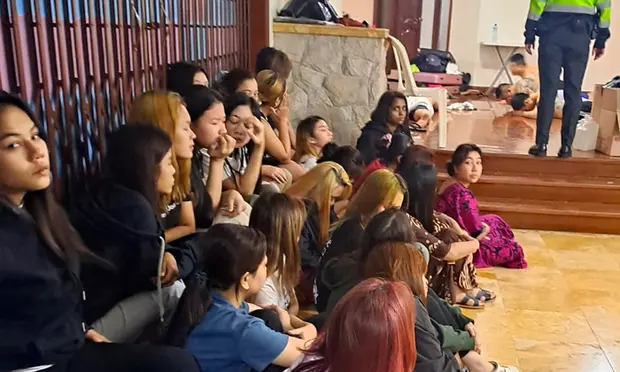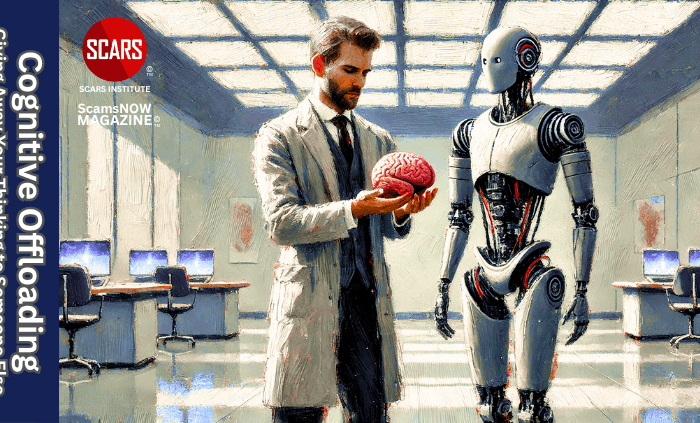Scam Slavery Comes To Peru – 43 Malaysians Freed From Scam Center
By SCARS Editorial Team – Society of Citizens Against Relationship Scams Inc., Portions by Associated Press
Peru Has Become A Hub For Scam Slavery In Recent Years, With Criminals Using Increasingly Sophisticated Methods To Lure Victims Into Their Traps
44 Asian migrants (43 Malaysians) were held captive as scam slaves by the Taiwanese criminal organization Red Dragon, who were used to extort money from victims abroad via telephone calls from Lima,
This type of scammers in Peru and Southeast Asia often target vulnerable people, such as those who are unemployed or have financial difficulties in Asia and Latin America.
They may offer victims lucrative jobs or investment opportunities, but once the victims arrive in Peru, they are forced to work long hours in dangerous conditions and their passports are confiscated.
One of the most common types of scam slavery in Peru is phone scams. Scammers will force captives to call people in other countries and pretend to be from a legitimate company, such as a bank or government agency. They will then try to convince the victims to give them personal information or money. Once the victims have given up their information, the scammers can use it to steal their money or identity.
Another common type of scam slavery in Peru is Pig Butchering investment scams. Scammers force the slaves to offer victims the opportunity to invest in a lucrative business or investment opportunity. However, once the victims have invested their money, the scammers will disappear and the victims will lose all of their money.
Scammers are also using increasingly sophisticated methods to target people on social media. They create fake profiles and pretend to be romantic partners or friends. Once they have gained the victim’s trust, they may ask the victim to come to Peru to visit them. However, once the prospect job seeker arrives in Peru, they are forced into slavery.
The Peruvian government is working to combat scam slavery, but it is a difficult problem to solve. Scammers are often well-organized and operate across borders. The government is working to raise awareness of scam slavery and to help victims who have been trafficked to Peru.
Latest News
In two stories from AP, Peruvian scam slavers held dozens of Malaysian scam slaves in call centers to perform phone scams.
From AP – October 9, 2023
43 Malaysians were caught in a phone scam operation in Peru and rescued from human traffickers
KUALA LUMPUR, Malaysia (AP) — Malaysia said Monday that 43 citizens have been rescued by police in Peru after they fell victim to a human trafficking syndicate operating a telecommunication fraud.
They Malaysians were involved in the so-called “Macau scam” that reportedly originates from crime syndicates in Taiwan and China, in which scammers impersonate banks or a public official to trick a person into disclosing their personal banking details or transfer money into a third-party account.
The Foreign Ministry said in a statement that Peruvian police found the 43 Malaysians after raiding a house in La Molina in the capital Lima on Oct. 7. It said the Malaysian Embassy in Lima had visited them and found them in good condition.
“All victims have also undergone an investigation process and will be repatriated to Malaysia” soon, it said. No further details were provided on how the Malaysians were ensnared by the syndicate or how they ended up in Peru.
Activists and government officials say hundreds of Malaysians have been lured by lucrative job offers in Southeast Asian nations such as Myanmar, Thailand, Cambodia and Laos, only to end up being made to defraud online users with internet romances and cryptocurrency schemes.
From AP – October 10, 2023
43 Malaysians freed from phone scam syndicate in Peru were young people who arrived a week earlier
KUALA LUMPUR, Malaysia (AP) — The 43 Malaysians rescued from a human trafficking syndicate operating a telecommunication fraud in Peru were young people who had arrived in Lima just a week earlier, Malaysian police said Tuesday.
The Malaysians were ensnared in a scam that reportedly originates from crime syndicates in Taiwan and China, in which scammers impersonate banks or a public official to trick a person into disclosing personal banking information or transfer money. Hundreds of Malaysians have been lured by job offers in other Southeast Asian nations only to end up being forced to defraud people through online romance or cryptocurrency schemes.
“This is the first such (trafficking) case in Peru (involving Malaysians). We are trying to do our best to educate Malaysians including on social media but these job scams still happen,” Malaysian police chief Razarudin Husain told a news conference.
The 26 women and 17 men arrived in Peru on Sept. 29 and were fortunate to have been freed on Saturday after Peruvian police raided a house in La Molina in the capital Lima, he said.
Three of the Malaysians are just 18 and the oldest in the group is 36, he said.
The Foreign Ministry has said the 43 victims were in good condition and would be repatriated to Malaysia once investigation in Lima was completed.
Razarudin said the 43 victims left Malaysia legally and that police were still investigating details of how they were recruited, and how they ended up in Peru.
The Utusan Malaysia newspaper reported that two of the women escaped from the house in an affluent neighborhood and were taken to the police after seeking help from a neighbor. The daily, citing local reports in Peru, said the initial investigation had identified the syndicate involved as The Red Dragon of Taiwan and that mobile phones, debit cards and cash had been seized.
More:
- Mexico Is Now The New Scam Battleground (romancescamsnow.com)
- Human Trafficking & Scam Slavery – UN Issues New Report (scamsnow.com)
- Coming In Contact With Forced Labor Scammer Slaves (scamsnow.com)
- INTERPOL Issues Global Warning On Human Trafficking-Fueled Fraud (scamsnow.com)
- Scam Slavery In Southeast Asia (romancescamsnow.com)
- Scam Syndicates in Southeast Asia – Guest Editorial (romancescamsnow.com)
- China Cracks Down On Scammers – Chinese & Myanmar Police Arrests 1207 Scammers In Myanmar (scamsnow.com)
- China Cracks Down On Scammers – Chinese & Myanmar Police Arrests 269 Scammers In Myanmar (scamsnow.com)
- 88 Chinese Scammers Arrested In Indonesia (scamsnow.com)
- Human Scam Trafficking – The Knoble Report (scamsnow.com)
- The New World Order – Scamming in Southeast Asia (romancescamsnow.com)
SCARS Resources:
- For New Victims of Relationship Scams newvictim.AgainstScams.org
- Subscribe to SCARS Newsletter newsletter.againstscams.org
- Sign up for SCARS professional support & recovery groups, visit support.AgainstScams.org
- Find competent trauma counselors or therapists, visit counseling.AgainstScams.org
- Become a SCARS Member and get free counseling benefits, visit membership.AgainstScams.org
- Report each and every crime, learn how to at reporting.AgainstScams.org
- Learn more about Scams & Scammers at RomanceScamsNOW.com and ScamsNOW.com
- Global Cyber Alliance ACT Cybersecurity Tool Website: Actionable Cybersecurity Tools (ACT) (globalcyberalliance.org)
- Self-Help Books for Scam Victims are at shop.AgainstScams.org
- Donate to SCARS and help us help others at donate.AgainstScams.org
- Worldwide Crisis Hotlines: International Suicide Hotlines – OpenCounseling : OpenCounseling
- Campaign To End Scam Victim Blaming – 2024 (scamsnow.com)
-/ 30 /-
What do you think about this?
Please share your thoughts in a comment below!
More ScamsNOW.com Articles
-/ 30 /-
What do you think about this?
Please share your thoughts in a comment above!
SCARS LINKS: AgainstScams.org RomanceScamsNOW.com ContraEstafas.org ScammerPhotos.com Anyscam.com ScamsNOW.com
reporting.AgainstScams.org support.AgainstScams.org membership.AgainstScams.org donate.AgainstScams.org shop.AgainstScams.org
youtube.AgainstScams.org linkedin.AgainstScams.org facebook.AgainstScams.org
ARTICLE RATING
TABLE OF CONTENTS
CATEGORIES
MOST POPULAR COMMENTED ARTICLES
POPULAR ARTICLES
U.S. & Canada Suicide Lifeline 988
![NavyLogo@4x-81[1]](https://scamsnow.com/wp-content/uploads/2025/04/NavyLogo@4x-811.png)
ARTICLE META
WHAT PEOPLE ARE TALKING ABOUT LATEST SITE COMMENTS
See Comments for this Article at the Bottom of the Page
on Scam Victims Use Work To Avoid Healing: “The last 6 years have been the most difficult of my life. The pandemic, having both parents in the hospital…” Jun 29, 18:38
on Entitlement Mentality And How Scam Victims Often Lose Their Path To Recovery – 2024: “Thank you for this discussion of entitlement. I can see from the descriptions listed that I have not felt entitlement.…” Jun 29, 18:22
on Samurai Wisdom and Rituals for Clearing the Mind After Scam Trauma – 2025 – [VIDEOS]: “A great guide on how to move forward in our recovery process with a calm mind, cleansed on an ongoing…” Jun 28, 07:34
on Delayed Gratification and Patience in Scam Victim Recovery – 2025 – [VIDEOS]: “We want to recover quickly and… we make new mistakes. How not to speed up the recovery process, how to…” Jun 28, 06:41
on The Unique Injury Of Betrayal Trauma On Scam Victims – 2024: “Primarily because you did not see it coming” Jun 27, 23:57
on Changes In A Scam Victim’s Life: “I really detest the way my trust in others has been affected by the scamming I went through. I used…” Jun 27, 14:47
on The Unique Injury Of Betrayal Trauma On Scam Victims – 2024: “Betrayal Trauma is the worst feeling ever. Why does it seem so much worse when a scammer does that to…” Jun 27, 14:34
on EMDR Therapy For Scam Victims’ Trauma – A Part Of The Recovery Process For Many – 2024: “Very comprehensive article explaining all aspects of EMDR. I’d only heard of it before and now I have a much…” Jun 26, 19:01
on Forgiving Yourself After Surviving a Romance or Investment Scam – 2025: “Thank you for this valuable article. Self-forgiveness was for me the biggest step that led to my recovery. That also…” Jun 26, 17:28
on Counseling And Your Native Language: “These points make perfect sense. I can’t imagine trying to express complex emotions in a second language. I realize many…” Jun 26, 16:05
on Thought-Terminating Cliches – How What You and Others Say Stops Critical Thinking and Recovery for Scam Victims – 2025: “I didn’t realize that these “innocent phrases” clichés ending thoughts, can have such effect / negative -inhibiting / on our…” Jun 26, 14:48
on Scam Victim Resistance In Support Groups Therapy Or Counseling Can Destroy Opportunities For Recovery – 2024: “Working with either a support group or therapist to me means a self commitment to actively participating in the therapy.…” Jun 24, 21:01
on ‘I Just Want To Forget It’ – Denial & Avoidance Are Natural But Will Not Help Scam Victims On Their Path To Recovery From Scams – 2024: “My financial loss, the shock and betrayal of the crime ending all combined to fray my nerves and spend hours…” Jun 24, 20:10
on You Hate Being Told What To Do? How Your Rebellious Mentality Can Sabotage Your Recovery – 2025: “I am a bit of a rebel, and the moment someone tells me to do something, worse, does it even…” Jun 24, 15:04
on You Hate Being Told What To Do? How Your Rebellious Mentality Can Sabotage Your Recovery – 2025: “You are very welcome” Jun 24, 03:01
on You Hate Being Told What To Do? How Your Rebellious Mentality Can Sabotage Your Recovery – 2025: “This is a great article, which makes perfect sense as to why anyone would resist the help offered to them.…” Jun 23, 20:01
on Scam Victims’ Responsibilities – 2021 [Updated 2025]: “Thank you for this article. As I continue my journey, I focus on the here and now and let the…” Jun 21, 16:26
on Scam Victims Avoid Or Escape The Aftermath Of Scams – How Denial And Distraction Avoid Confronting Reality – 2024: “In the earliest days after my crime I felt powerless, helpless and weak. I had been through so much in…” Jun 21, 14:46
on Problems and Opportunities – Thoughts on Psychological Reframing – 2025: “An article that really helped me look at the problems in my life from a different point of view and…” Jun 21, 14:42
Important Information for New Scam Victims
Please visit www.ScamVictimsSupport.org – a SCARS Website for New Scam Victims & Sextortion Victims
SCARS Institute now offers a free recovery program at www.SCARSeducation.org
Please visit www.ScamPsychology.org – to more fully understand the psychological concepts involved in scams and scam victim recovery
If you are looking for local trauma counselors, please visit counseling.AgainstScams.org
If you need to speak with someone now, you can dial 988 or find phone numbers for crisis hotlines all around the world here: www.opencounseling.com/suicide-hotlines
Statement About Victim Blaming
Some of our articles discuss various aspects of victims. This is both about better understanding victims (the science of victimology) and their behaviors and psychology. This helps us to educate victims/survivors about why these crimes happened and not to blame themselves, better develop recovery programs, and help victims avoid scams in the future. At times, this may sound like blaming the victim, but it does not blame scam victims; we are simply explaining the hows and whys of the experience victims have.
These articles, about the Psychology of Scams or Victim Psychology – meaning that all humans have psychological or cognitive characteristics in common that can either be exploited or work against us – help us all to understand the unique challenges victims face before, during, and after scams, fraud, or cybercrimes. These sometimes talk about some of the vulnerabilities the scammers exploit. Victims rarely have control of them or are even aware of them, until something like a scam happens, and then they can learn how their mind works and how to overcome these mechanisms.
Articles like these help victims and others understand these processes and how to help prevent them from being exploited again or to help them recover more easily by understanding their post-scam behaviors. Learn more about the Psychology of Scams at www.ScamPsychology.org
SCARS INSTITUTE RESOURCES:
If You Have Been Victimized By A Scam Or Cybercrime
♦ If you are a victim of scams, go to www.ScamVictimsSupport.org for real knowledge and help
♦ Enroll in SCARS Scam Survivor’s School now at www.SCARSeducation.org
♦ To report criminals, visit https://reporting.AgainstScams.org – we will NEVER give your data to money recovery companies like some do!
♦ Follow us and find our podcasts, webinars, and helpful videos on YouTube: https://www.youtube.com/@RomancescamsNowcom
♦ Learn about the Psychology of Scams at www.ScamPsychology.org
♦ Dig deeper into the reality of scams, fraud, and cybercrime at www.ScamsNOW.com and www.RomanceScamsNOW.com
♦ Scam Survivor’s Stories: www.ScamSurvivorStories.org
♦ For Scam Victim Advocates visit www.ScamVictimsAdvocates.org
♦ See more scammer photos on www.ScammerPhotos.com
You can also find the SCARS Institute on Facebook, Instagram, X, LinkedIn, and TruthSocial
Psychology Disclaimer:
All articles about psychology and the human brain on this website are for information & education only
The information provided in this and other SCARS articles are intended for educational and self-help purposes only and should not be construed as a substitute for professional therapy or counseling.
Note about Mindfulness: Mindfulness practices have the potential to create psychological distress for some individuals. Please consult a mental health professional or experienced meditation instructor for guidance should you encounter difficulties.
While any self-help techniques outlined herein may be beneficial for scam victims seeking to recover from their experience and move towards recovery, it is important to consult with a qualified mental health professional before initiating any course of action. Each individual’s experience and needs are unique, and what works for one person may not be suitable for another.
Additionally, any approach may not be appropriate for individuals with certain pre-existing mental health conditions or trauma histories. It is advisable to seek guidance from a licensed therapist or counselor who can provide personalized support, guidance, and treatment tailored to your specific needs.
If you are experiencing significant distress or emotional difficulties related to a scam or other traumatic event, please consult your doctor or mental health provider for appropriate care and support.
Also read our SCARS Institute Statement about Professional Care for Scam Victims – click here
If you are in crisis, feeling desperate, or in despair, please call 988 or your local crisis hotline.
More ScamsNOW.com Articles
A Question of Trust
At the SCARS Institute, we invite you to do your own research on the topics we speak about and publish. Our team investigates the subject being discussed, especially when it comes to understanding the scam victims-survivors’ experience. You can do Google searches, but in many cases, you will have to wade through scientific papers and studies. However, remember that biases and perspectives matter and influence the outcome. Regardless, we encourage you to explore these topics as thoroughly as you can for your own awareness.















![scars-institute[1]](https://scamsnow.com/wp-content/uploads/2025/04/scars-institute1.png)
![niprc1.png1_-150×1501-1[1]](https://scamsnow.com/wp-content/uploads/2025/04/niprc1.png1_-150x1501-11.webp)
